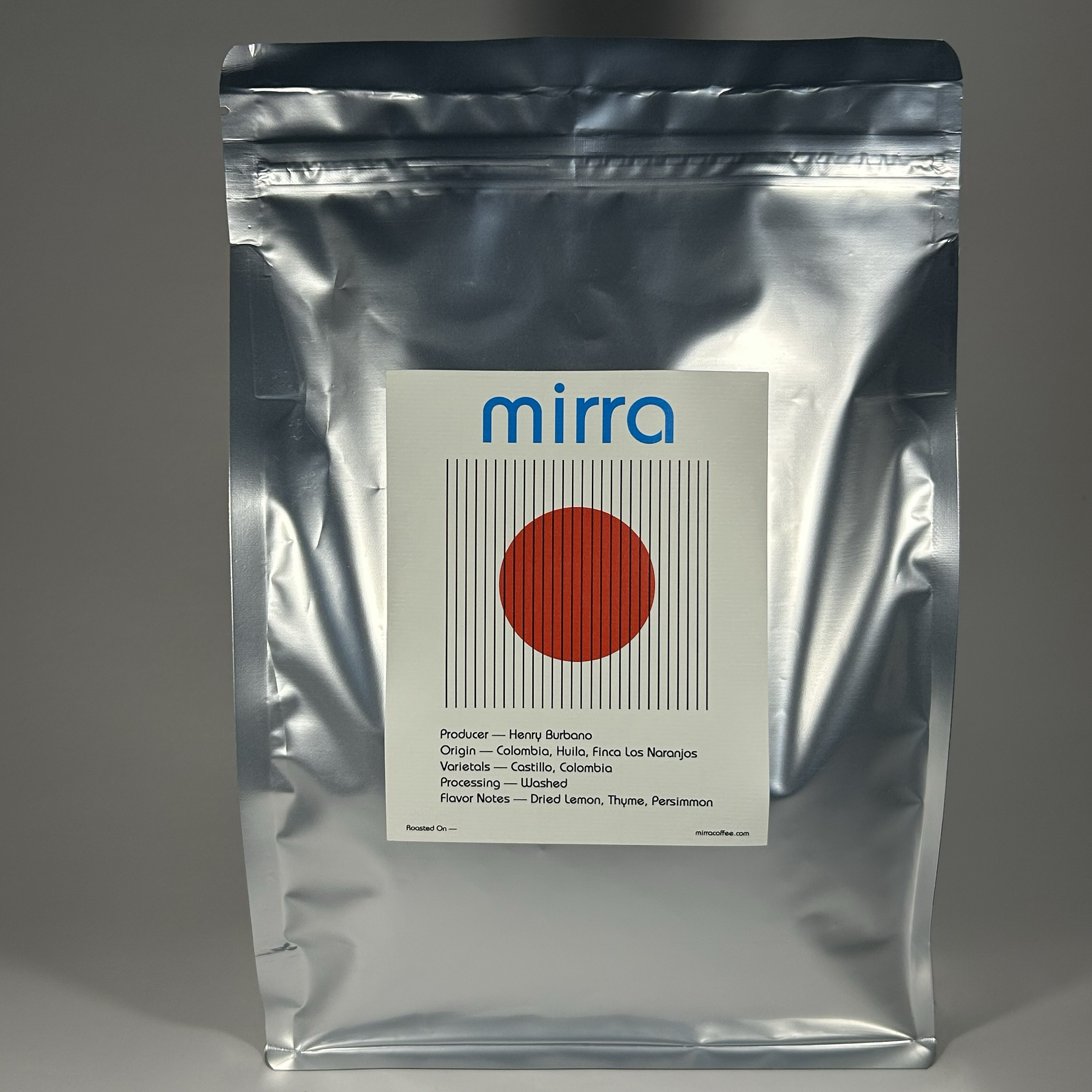 Image 1 of 3
Image 1 of 3

 Image 2 of 3
Image 2 of 3

 Image 3 of 3
Image 3 of 3




Colombia Henry Burbano
With this beautiful lot from producer Henry Burbano of Finca Los Naranjos in Huila, we welcome in our very first Colombian field blend. We have wanted to begin introducing field blends from Colombia to our menu for a while, but before this lot landed in front of us, we had been unsuccessful in our search. In field blends, just like in our single-varietal offerings, we are looking for an equally high degree of complexity, clarity, sweetness, and cleanliness in the cup—so this certainly isn’t an offering to snooze on as it delivers abundantly on all of these fronts. The single adjective that best describes this coffee is ‘delicate;’ it leads with a note of mellow dried lemon and a sweet thyme-like herbality, which is supported throughout by a syrupy, honeyed persimmon sense.
Henry Burbano began his farm, Los Naranjos, nearly twenty years ago with attaining the financial security and independence of his family as his primary goal; in that time he’s managed to accomplish this goal through the careful, intentional cultivation of quality varietals such as castillo and colombia, which make up this lot. Los Naranjos is located in the department of Huila, nearest to Purutal village, at an elevation of 1.790 masl. Several members of Henry’s family, including his wife, are heavily involved in the farm’s operations, and they additionally employ 13 farmers to help on the 1.5 hectare farm during the harvest seasons.
This lot consists of a blend of the castillo and colombia varietals. Castillo, like colombia, is a cross between caturra and timor hybrid, also developed by Cenicafe. It was first released in 2005 in response to the persistence of coffee leaf rust. Where caturra was once the most common varietal in Colombia, now castillo has taken its place, making up over 40% of all coffee grown there. Named for researcher Jamie Castillo, castillo does better than most varietals when planted in higher density due to the tree’s dwarfism, and as such has a relatively higher yield. Although its quality can range, castillo is able to yield beautiful final cups under careful cultivation, at altitude. In fact in a blind cupping alongside one of Colombia’s most lauded varietals, caturra, there was no notable difference in quality between the two varietals according to professional tasters. The colombia varietal was developed by researchers at the Cenicafe laboratory in Colombia by crossing caturra and timor hybrid (just like castillo), and was first released for cultivation in 1982. It was bred in anticipation of future outbreaks of leaf rust in Colombia, and is relatively resistant as a consequence. Many credit this varietal for saving the Colombian coffee industry following the arrival of leaf rust in the mid-1980’s. Although its quality can range, colombia is able to yield beautiful final cups under careful cultivation, at altitude.
All coffee is sold whole-bean to reduce oxidization, and increase the longevity of volatile aromatic compounds.
With this beautiful lot from producer Henry Burbano of Finca Los Naranjos in Huila, we welcome in our very first Colombian field blend. We have wanted to begin introducing field blends from Colombia to our menu for a while, but before this lot landed in front of us, we had been unsuccessful in our search. In field blends, just like in our single-varietal offerings, we are looking for an equally high degree of complexity, clarity, sweetness, and cleanliness in the cup—so this certainly isn’t an offering to snooze on as it delivers abundantly on all of these fronts. The single adjective that best describes this coffee is ‘delicate;’ it leads with a note of mellow dried lemon and a sweet thyme-like herbality, which is supported throughout by a syrupy, honeyed persimmon sense.
Henry Burbano began his farm, Los Naranjos, nearly twenty years ago with attaining the financial security and independence of his family as his primary goal; in that time he’s managed to accomplish this goal through the careful, intentional cultivation of quality varietals such as castillo and colombia, which make up this lot. Los Naranjos is located in the department of Huila, nearest to Purutal village, at an elevation of 1.790 masl. Several members of Henry’s family, including his wife, are heavily involved in the farm’s operations, and they additionally employ 13 farmers to help on the 1.5 hectare farm during the harvest seasons.
This lot consists of a blend of the castillo and colombia varietals. Castillo, like colombia, is a cross between caturra and timor hybrid, also developed by Cenicafe. It was first released in 2005 in response to the persistence of coffee leaf rust. Where caturra was once the most common varietal in Colombia, now castillo has taken its place, making up over 40% of all coffee grown there. Named for researcher Jamie Castillo, castillo does better than most varietals when planted in higher density due to the tree’s dwarfism, and as such has a relatively higher yield. Although its quality can range, castillo is able to yield beautiful final cups under careful cultivation, at altitude. In fact in a blind cupping alongside one of Colombia’s most lauded varietals, caturra, there was no notable difference in quality between the two varietals according to professional tasters. The colombia varietal was developed by researchers at the Cenicafe laboratory in Colombia by crossing caturra and timor hybrid (just like castillo), and was first released for cultivation in 1982. It was bred in anticipation of future outbreaks of leaf rust in Colombia, and is relatively resistant as a consequence. Many credit this varietal for saving the Colombian coffee industry following the arrival of leaf rust in the mid-1980’s. Although its quality can range, colombia is able to yield beautiful final cups under careful cultivation, at altitude.
All coffee is sold whole-bean to reduce oxidization, and increase the longevity of volatile aromatic compounds.




